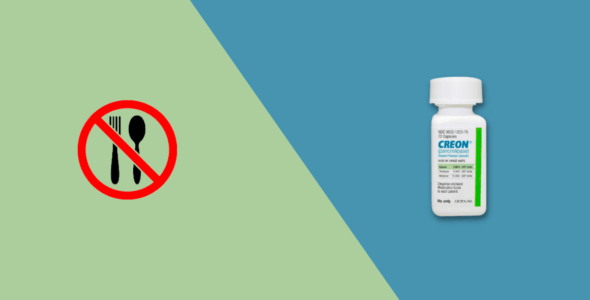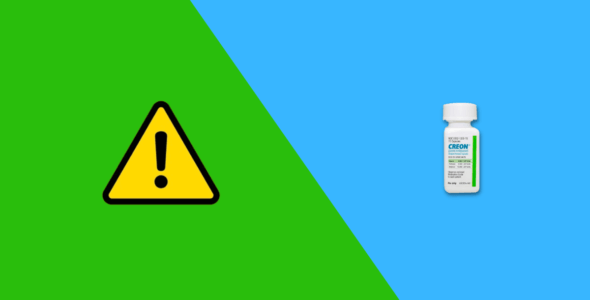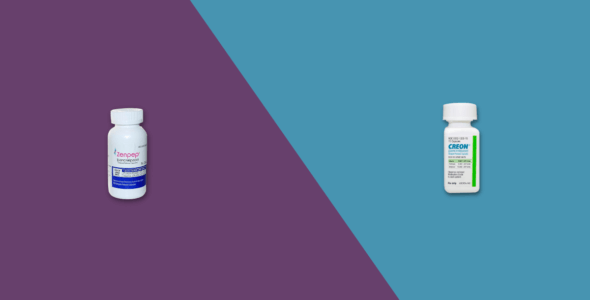Pancreaze and Creon are brand names for prescription drugs used for the treatment of pancreatic enzyme replacement therapy due to medical conditions such as cystic fibrosis.
Here we will explain how they work, their similarities and differences, their side effects, and more. This should provide you with the basics to better understand your options.
What is Pancreaze?
Pancreaze is an FDA-approved (U.S. Food and Drug Administration) medication manufactured by McNeil Pediatrics. It is used for the treatment of exocrine pancreatic insufficiency (EPI) due to cystic fibrosis or other conditions. Pancreaze contains pancrelipase a combination of porcine lipases, proteases, and amylases. It belongs to a class of drugs called pancreatic/digestive enzymes.
Pancreaze works by replacing pancreatic enzymes. It helps to break down starches into dextrins, maltose, and maltotriose, fats into monoglycerides, glycerol, free fatty acids, and proteins into peptides and amino acids in the duodenum and proximal small intestine.
Pancreaze dosage
Pancreaze is available as a delayed-release capsule dosage form, in the following doses:
- 4,200 USP units of lipase; 10,000 USP units of protease; 17,500 USP units of amylase
- 10,500 USP units of lipase; 25,000 USP units of protease; 43,750 USP units of amylase
- 16,800 USP units of lipase; 40,000 USP units of protease; 70,000 USP units of amylase
- 21,000 USP units of lipase; 37,000 USP units of protease; 61,000 USP units of amylase
Pancreaze can not be swapped for any other pancrelipase product. The dose given will be based on your age, and body weight, but should not exceed the recommended maximum dose recommended by the Cystic Fibrosis Foundation Consensus Conferences Guidelines. Pancreaze capsules should be swallowed whole. Patients that are not able to swallow capsules, may open the capsule and sprinkle the contents on applesauce before consuming.
Read the full prescribing information and always speak to a healthcare professional about any changes to your dose so they can monitor and evaluate your condition.
What is Creon?
Creon is an FDA (U.S. Food and Drug Administration) approved medication manufactured by Abbott Laboratories. Creon is a type of pancreatic enzyme replacement therapy (PERT) used to help improve digestion by breaking down fats, starches, and proteins in your food. It is a combination of porcine-derived lipases, proteases, and amylases. It can treat conditions such as cystic fibrosis, chronic pancreatitis, pancreatectomy, and pancreatic cancer where your pancreas does not produce or release enough enzymes.
Creon releases high levels of lipase, amylase, and protease into the duodenum following activation by its alkaline pH. This facilitates the breakdown of fats into glycerol and free fatty acids, starches into dextrins and sugars, and proteins into amino acids and peptides. The effectiveness of Creon is dependent on several factors such as the dose, your gastrointestinal pH, and the microsphere size of the medication.
RELATED: What is Creon
Creon dosage
Creon is available as a delayed-release capsule formulation, in the following doses:
- 6,000 USP units of lipase; 19,000 USP units of protease; 30,000 USP units of amylase
- 12,000 USP units of lipase; 38,000 USP units of protease; 60,000 USP units of amylase
- 24,000 USP units of lipase; 76,000 USP units of protease; 120,000 USP units of amylase
Your dose will be based on your body weight or the number of fatty foods you eat. Do not switch Creon with other pancreatic enzyme products without talking to your doctor. Take Creon with a meal or snack, but make sure you don’t go over your total daily dose.
Patients that are not able to swallow capsules, may open the capsule and sprinkle the contents on applesauce before consuming. Drink water or juice to be sure there is no Creon left in the mouth.
Read the full prescribing information and always speak to a healthcare professional about any changes to your dose so they can monitor and evaluate your condition.
RELATED: Creon Dosage
Common side effects of Pancreaze and Creon
The most common side effects of Pancreaze in clinical trials include:
- Abdominal pain
- Flatulence, diarrhea, abnormal feces
- Fatigue
More serious side effects of Pancreaze include:
- Fibrosing colonopathy
- Irritation of oral mucosa
- Risk of viral transmission with all pancreatic enzyme products
The most common side effects of Creon can include:
- Abdominal pain
- Headache
- Hyperglycemia
- Hypoglycemia
- Bloating
- Flatulence
- Vomiting
- Frequent bowel movements
- Constipation
- Dizziness
- Cough
- Sore throat
- Weight loss
Some serious side effects of Creon include:
- Fibrosing colonopathy (scarring of your colon)
- Increase in uric acid levels
- Viral infection
- Allergic reactions (hives, face swelling, throat tightness, difficulty breathing)
These aren’t all the side effects Pancreaze or Creon can cause. You can find more details in the patient leaflet that comes with your medication. If you have any concerns about side effects, talk to your physician or pharmacist.
Pancreaze and Creon drug interactions
While no drug interactions of Pancreaze or Creon have been identified, you should make sure your doctor is aware of all the medications you take, including prescription drugs, over-the-counter medications, vitamins, and herbal supplements.
Pancreaze and Creon contraindications
You should not use Pancreaze if you:
- Are allergic to pork (pig) products
- Are allergic to any of the other ingredients in Pancreaze
Talk to your doctor before using Pancreaze if you:
- Are taking any of the medications that could interact with Pancreaze
- Have a history of blockage of your intestines, scarring or thickening of your bowel wall (fibrosing colonopathy)
- Have gout, kidney disease, or high blood uric acid (hyperuricemia)
- Have difficulty swallowing capsules
- Are pregnant or plan to become pregnant
- Are breastfeeding or plan to breastfeed. It is not known if Pancreaze passes into your breast milk
You should not use Creon if you:
- Are allergic to pork or any pig products
- Have known hypersensitivity to Creon or any of its inactive ingredients
Talk to your doctor before using Creon if you:
- Have or have ever had fibrosing colonopathy
- Have or have ever had any intestinal blockages
- Have kidney disease
- Have gout
- Have high blood uric acid (hyperuricemia)
- Have problems swallowing capsules
- Are pregnant or plan to become pregnant
- Are breastfeeding or plan to breastfeed
Other drugs for the treatment of pancreatic enzyme replacement therapy
- Zenpep
- Viokace
- Pertzye
- Lactaid
- Ultresa
If you have any concerns about Pancreaze or Creon side effects, talk to your physician, or pharmacist for medical advice. Also inform your healthcare provider about any medical conditions, supplements, and over-the-counter meds you are taking. You are also encouraged to report side effects to the FDA: visit http://www.fda.gov/medwatch or call 1-800-FDA-1088.



